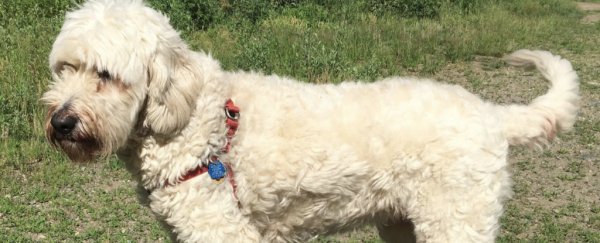Quick: What kind of dog is that?
Using its scruffy face, plump black nose and blondish fur as clues, you might guess that it's part or all Wheaten terrier. And that might lead you to think this dog, being of the vermin-catching terrier stock, would like to chase other animals.
 (Darwin's Dogs)
(Darwin's Dogs)
But according to a DNA test by researchers at the University of Massachusetts and the Broad Institute, this dog, a male named Hubble, is a poodle-golden retriever hybrid known as a "goldendoodle," plus some dashes of other breeds that share ancestry with those two.
Unlike terriers, this crossbreed is said to have a low "prey drive."
The heritage of Hubble, the pet of a U-Mass. medical school professor, is just one small slice of a large study on the genetics of dog behavior.
But the researchers and dog behaviorists behind it want to know whether ordinary people can guess his bloodlines by looking at his photo — because what we think dogs are made of influences our expectations of them, and those in turn can influence the animals' behavior.
To find out, they've just launched an online quiz called "Mutt Mix." If you've got some time — and with around 40 dogs to scrutinize, it does take time — you can log on and test your breed-guessing abilities.
"We're pretty sure everyone is going to be wrong," said Marjorie Alonso, executive director of the International Association of Animal Behavior Consultants, a partner in the project.
But that's okay, Alonso clarified: "We have been. None of us have been right about anything."
Mutt Mix is an offshoot of a bigger canine genetics study called Darwin's Dogs.
Researchers led by Elinor Karlsson, a professor of bioinformatics and integrative biology, are collecting saliva samples from thousands of U.S. dogs and owner-completed questionnaires about the pets.
The questionnaires, designed with Alonso and her colleagues, focus on well-established mental disorders as well as behaviors that have been selected by humans, such as retrieving.
A third focus is on quirks that seem unlikely to have been learned or taught — actions such as crossing paws, tilting heads and eating grass.
Nailing down which genes are associated with specific behaviors could make it easier to identify successful working dogs, Karlsson said, or help owners better deal with challenging pets.
But that's the end goal. Not long after launching this study, Karlsson said, the scientists realized that how a dog acts probably isn't only about training or genes.
"People look at dogs, and they'll see certain breeds in a mutt … and may even treat the dog differently depending on what they think the dog is," Karlsson said. "But the first part of that is: Do people even get it right?"
The Mutt Mix quiz will provide that data, said Karlsson, who conceded she isn't totally sure what role the results will play in their larger project. "Part of being a scientist is you just get to ask fun questions," she said.
Intrigued? There's a caveat: Unlike with most Internet quizzes, you won't get any results until mid-June, after Mutt Mix shuts down.
This is for science, after all, and Karlsson doesn't want leaked answers to create bias in the results. (Hubble and a few other dogs are part of a sample set.)
So quiz-takers will, for now, be analyzing dog photos for the pure fun of it — or the pure frustration. Take this pooch, Maizie:
 (Darwin's Dogs)
(Darwin's Dogs)
She's got to be a good bit boxer or American pit bull terrier, right?
Nope.
 (Darwin's Dogs)
(Darwin's Dogs)
2018 © The Washington Post
This article was originally published by The Washington Post.
